Here, as promised, is the concluding part of the recent long interview with Ivanchuk. As well as talking about women players, his favourite games, and when he might quit the game, his wife Oksana also joins the conversation. Few would disagree with her view that “Vassily’s easy to love.”
Part I of my translation can be found here: Vassily Ivanchuk: “I’m a very ambitious person”
The Russian source is: Elena Sadovnik’s interview with Ivanchuk at Sport-Express.ua
FEMALE LOGIC DIFFERS LITTLE FROM MALE LOGIC
And do you like playing chess against women?
I wouldn’t say I do particularly, but I also wouldn’t say I don’t like it. In general, I try not to make an exception out of games against women. In chess, female logic differs little from male logic, which you can see just by analysing games. After all, the strongest female players work with men in one way or another. I don’t know what the female style of play is. Or more precisely, I don’t see any difference when compared to male play. In everyday life I also don’t divide people into men and women. For me, personal qualities, mentality and upbringing are the important things when spending time with people.
In one interview, Maia Chiburdanidze recalled that after losing to Judit Polgar you were so upset that you wouldn’t let anyone get close to you.
Polgar’s neither here nor there. (Laughs) I didn’t get upset because I’d lost to a woman, but simply because I’d lost. After losses I don’t want to see anyone – I don’t want to talk to anyone. A loss, let me tell you, is a less-than-average pleasure. And besides, I’ve played Polgar more than once. The score’s still in my favour, even if not significantly. She’s a very interesting chess player: talented, fanatical and with a great capacity for work.
What guides you when you’re choosing assistants and seconds?
First and foremost, an assistant must be interesting to me as a chess player, in terms of their particular style of play. As well as that, we have to be mentally compatible. Perhaps that plays a bigger role than the chess component. The same thing applies to the link between a trainer and student. Sometimes you find that a qualified teacher isn’t capable of unleashing the potential of a talented student due to incompatible personalities. A child can sometimes work better with a less qualified trainer, but one who’s capable of understanding and sensing what’s required for that particular student. I was very lucky with my trainers and I’ve had a lot of them. I once used to play for the team of the Carpathian Military District. There was no lack of good masters there, and they all worked with me in turn. I learned an awful lot at precisely that time.
Did they immediately discover your chess talent?
In the beginning nobody even thought about talent. I simply really wanted to play, as the sport had won me over. It all began when my dad was given a magnetic chess set for his birthday. I liked the pieces, and I asked my father to tell me about the game, to show me how to move. Then I wanted to know more, and my mum brought me a few books from school. My first book was Journey to the Chess Kingdom by Averbakh and Beilin. Then I began to solve chess puzzles in the magazines we subscribed to. It was my first trainer, Gennady Vasilenko, who said that I’d become a successful chess player. “At the very least you’ll make grandmaster”, he would repeat. And back then there weren’t that many grandmasters – significantly fewer than nowadays.
FLAWED GAMES ARE THE MOST BEAUTIFUL
You’ve had so many victories. Is there one among them which you recall more often than the others?
In general, I’ve always believed that my greatest, and therefore also my most memorable victories, still lie ahead. But it’s true that I really do have a lot of favourite games. But you know how it is? After any game you play people start analysing it “to shreds”. Immediately after a won game it can strike you as truly beautiful and almost perfect. But then it turns out that at certain points there were mistakes, minor inaccuracies.
Have I played flawless games? Of course. But flawed games are usually the most beautiful and are dearer to me. If an opponent doesn’t put up much resistance then it’s much easier to play a flawless game. You remember games where, despite being positionally lost, you nevertheless managed to escape with a draw. One such example is the game against Gata Kamsky at the tournament in Armenia in 2009. I was saved from a loss by the 50-move rule, which states that if not a single piece has been taken over the course of those moves then the game is declared a draw. Kamsky almost gained the chance to take my piece, but only on the 51st move. So I put up as much resistance as I could: I calculated whether he’d be able to carry out the capture, and how long I could avoid it. (smiles) As for losses… They’re painful for me. Fortunately time heals wounds, and your memory washes away the feeling of losing.
Vassily Ivanchuk – Gata Kamsky, Fide Grand Prix, Jermuk 2009
Game viewer by Chess Tempo
I never thought too much about which colour I prefer to play with. I simply prepare carefully for each game. I also don’t have a preference for the format of the game. I like to play classical chess, but I get no less pleasure from blindfold, blitz and rapid. I’ve also played Fischer Random Chess in the past.
How do you need to go about developing your memory in order to play blindfold chess successfully on a few boards at the same time?
Your memory develops during the training process, as chess players devote a lot of time to analysing without a board. There’s nothing supernatural about playing one game blindfold. The human brain is also capable of playing on a few boards simultaneously without sight of the board. At one time, particularly at turn of the 20th century, it was fashionable to hold simultaneous displays. The world record belongs to the International Master János Flesch, who gave a display on 52 boards. But then people abandoned the tradition: too great a load was harmful to your health. That’s no surprise, as after all that stressful simultaneous display by Flesch lasted for 13 and a half hours. I once gave a simul on nine boards in a Lviv school. I think I could also do it on a greater number of boards, but there’s no point in setting a personal record. I still smile when I remember another simultaneous display, in Lebanon, where I played on five boards against local players. Two players were conferring: “Here’s the move I’m going to make”. “What on earth are you doing? He’ll give check with his queen and take your knight”. To which the first replied, “You’re right, but after all he’s playing blind, so he won’t see anything!” Of course, I had to disappoint the guy: I took the knight with enormous pleasure. (laughs)
Where do you feel most comfortable playing?
In general I like travelling to new places. This year Gibraltar was something of a revelation for me. It was even better that I managed to win there. And in general, I’ve always played well in Estonia and Armenia. Why are no chess tournaments of that level held here, in Ukraine? Probably the sponsors aren’t particularly interested in inviting the chess elite, although talented and well-known players are a dime a dozen in our country. Ukrainian chess players are doing a good job of living up to one of the strongest Soviet chess schools. In the Soviet Union chess was a very popular sport. Money wasn’t spared on its development and there were chess clubs everywhere that allowed youngsters to work with high-quality coaches. That couldn’t but bring results.
To what percentage have you fulfilled your potential as a chess player?
It’s hard to measure achievement in percentages, but I can definitely say to a significant degree. At the same time, however, I don’t feel as though I’ve reached my limit.
Not so long ago the 80-year-old Victor Korchnoi took part in a tournament. When do you think it’s best to end your career: to stop while you’re virtually at your peak, undefeated, or to play on into advanced age, for pleasure, despite no longer having any hopes of achieving top results?
I think I’d also like to play on for as long as possible. And why not? If health and my inner strength allow, and I’ve still got ideas… It’s a different story that in that case you have to adapt your tournament schedule and make it less packed than in your younger years. But it’s not worth completely abandoning something you love.
THERE’S NO NEED TO BEG ME TO HELP OUT WITH THE HOUSEWORK
In one interview you compared chess to love. Doesn’t your wife get offended by such comparisons, and by the fact that almost all your thoughts are about chess? (Translator’s note: in a recent interview GM Mikhail Golubev asked, “I’ve got a question from a fan. How can you find and not lose a taste for playing chess?” Ivanchuk replied: “You know, a taste for chess is a kind of love… and who can answer the question of how to find, or not lose, that love? I don’t know.”
Oksana’s got used to it, no doubt. It’s not our first year together, after all. Initially, of course, it was hit and miss, but such is the life of a chess player. At least between tournaments we try to lead a rich and varied life. Grandmaster Vladimir Malakhov once responded to a similar question by saying, “Yes, I often travel to tournaments, but when I get back home I’m completely at my wife’s disposal”. I don’t know about being completely at her disposal, but I try. I devote a lot of time between tournaments to domestic matters. I don’t have to be begged to do something. I try to assist my wife at home, offering to help. You’d better ask Oksana whether that works out or not. My wife doesn’t see me as a grandmaster, but as a normal man. Does she understand chess? She has some idea: she knows how the pieces move, the surnames of famous chess players and she reads the chess magazines I subscribe to. So she knows about everything that’s going on. Of course, my wife supports me and follows my performances. She’s very glad when I win, but at the same time she understands that it’s impossible to win all the time. Therefore she’s philosophical about my defeats.
Is it hard to be the wife of a chess genius? Oksana Ivanchuk asks herself. No, it’s not hard. You simply have to love that genius. (Laughs) Vassily’s easy to love: he’s very kind-hearted and intelligent. My husband is an interesting personality: what doesn’t he know about! I’m happy God granted me such a talented husband, and I’m proud of him. It’s nice to see people admire his chess talent, or say how intelligent and gifted he is.
What’s he like in everyday life? Normal. He doesn’t have any particular requirements. The main thing for him is to feel comfortable and have good food and a calm environment. It’s very important to have peace in his everyday life, as after all he has a very stressful and nerve-wracking job. Vassily loves to go out into nature and eat meat roasted on an open fire.
My husband is very caring. He makes sure we’ve got everything we need at home. He invites me to the theatre, to concerts. Recently he rang me: “Robertino Loreti’s going to be in Lviv. Do you want to go?” I really love music, so I agreed without a second thought. He often invites me to go with him to tournaments, so that while he’s playing I can relax and visit other towns and countries, seeing how people live there.
How did you get to know Vassily and what was your first impression on meeting him?
We got to know each other while we were still sixth graders. During a maths lesson a great teacher came into the class with a boy and said: “Children, here’s our new pupil, Vasya Ivanchuk. He plays chess and in future he’ll be a sportsman”. I liked him at first sight. I felt I’d have a very close and spiritual connection with the boy, and that he’d succeed in his professional life. I always believed in that. And, fortunately, that’s how it all worked out.
Anand called Ivanchuk the most eccentric chess player in the world. Why was that, do you think?
In his professional life he’s very unpredictable. Vassily can play a brilliant game in a completely hopeless situation. And he can let a win slip when it was practically in the bag. So his opponents can never predict how he’s going to play. That’s how he is by nature. But in everyday life, at least with those close to him, he’s completely different.
You often celebrate your birthday during the tournament in Nice or Monte Carlo. Do you like competing on your birthday? (A question addressed to the grandmaster)
This year Ivanchuk beat the World Champion and won a 1000 euro game-of-the-day prize on his birthday! | photo: Association Max Euwe, amberchess20.com
A lot. It’s a great chance to give myself a good present in the form of a win. It so happens that I almost always win on my birthday. It’s also nice when colleagues come up to you to shake your hand and wish you something nice.
How do fans behave during tournaments? Do they interfere with your play?
The largest public gathers in Moscow, at the Tal Memorial. They really love chess in Mexico and in Cuba, where everyone crams in. I don’t usually get distracted by fans if, of course, they’re not too insistent and behave decently. After all, in the tournament situation you sometimes want peace and privacy, while outsiders don’t always realise that.
And are you recognised on the streets of your native Lviv?
Yes. Sometimes people come up to say hello, ask how I am, or simply to wish me good luck…
As a bonus, I’ve given some highlights below of another interview with Ivanchuk that was conducted by Evgeny Surov of Chess-News shortly after the Gibraltar tournament earlier this year (you can also try reading the full version as translated by Google).
Ivanchuk proved a trickier interview subject, being very reluctant, for instance, to talk about the match he lost to Ruslan Ponomariov, but Surov has the journalistic virtues of great persistence and a willingness to ask awkward questions. The result was a long interview containing occasional gems, curious details, and a certain degree of impromptu comedy!
Chess books, Mao Zedong and the history of Ukraine for children
Which chess books are dear to you?
Lots of them. For example, I really like Lasker’s Manual of Chess. Or Bronstein’s Zurich International Chess Tournament 1953. Books by Alekhine, Botvinnik… I’ve read a lot of books. It’s difficult even to single any of them out. For example, when it comes to books on the opening, then Paul Keres wrote absolutely brilliant books. His ideas haven’t, I think, lost their relevance even today.
And do you think it’s worthwhile for contemporary young chess players to study books on the opening?
Yes, I think it’s worthwhile. By the way, returning to opening theory, Avrukh has written excellent books. A whole series of them. Ivan Sokolov also writes excellently, if you want some more modern examples. Incidentally, a wonderful book, in my opinion, is Edmar Mednis’ How to Beat Bobby Fischer.
I’ll explain why I asked you that question. In a recent interview with Vladimir Malakhov, a well-known Russian player, I read that he thinks there’s no need to read opening books at all. It’s much more productive to switch on your computer, select games by strong grandmasters from your database and analyse them yourself. (Translator’s note: see my translation of that interview from the Polish Chess Federation website here, Vladimir Malakhov: chess player, nuclear physicist)
Well, that’s also an option, of course, but it strikes me that doing one doesn’t stop you doing the other. What Malakhov recommends is undoubtedly useful, but, in my opinion, it’s also very useful to read some well-written books (I gave some examples).
And what kind of non-chess books do you like?
There’s a very wide range. Just now, for example, I’m reading a book on the life of Mao Zedong. And at the same time I’m reading The History of Ukraine for Children. In general, I’ve recently had a tendency to read a number of books simultaneously. I use bookmarks… And then it seems to me that you take in the information more quickly and effectively.
Do you often have a book in your hands? A non-chess book, I mean.
Yes, yes, in general I love reading.
But why a history of Ukraine for children in particular? What’s that connected to?
Well, in general, my trainer Mikhail Mikhailovich Nekrasov once explained to me that the very best is offered to children. That’s why I’m reading it and learning a great deal of extremely interesting information for myself.
Ivanchuk’s rules before games
And in general, do you spend a long time preparing for any individual game?
It varies. It depends on my opponent, and, ultimately, on my mood. But there are two rules I almost always try to follow and intend to follow in future. Rule one – stop any work on chess at ten in the evening, because if you continue then there might be (and often have been) problems sleeping. Your brain simply doesn’t switch off. And even if I manage to fall asleep, then my brain keeps working – meaning I wake up in the middle of the night… No good can come of that. And rule two – stop any chess activity half an hour before a game. Even if there are problems in some line – that’s it, goodbye, it’s too late.
Life as a game and circus…
There’s an expression: “our whole life’s a game”. How do you understand that?
You could say that for a long time I lived according to that script. Then I got my hands on a very interesting book which described models of life. There was “life as a struggle”, “life as a game”, “life as theatre”, “life as a circus”, and something else as well. And then there were descriptions of people who fall under each particular category. And I began to read. I read through the model of life as a “game” and realised that what was written there coincided in many ways with my own case. And I decided that still wasn’t enough, and I needed to add some other category. I reread the others and liked the idea of “life as a circus”. After that, many of the things that I used to take seriously, or even too seriously, I began to perceive with humour. I began to laugh about them, and I felt much better. So I managed to combine game and circus.
Feats of memory
I read that in 2007 you got married. For the second time, as I understand it.
In 2006, as far as I recall. The 18th November.
You remember the date of your wedding…
Well, my memory really isn’t that bad, on the whole… The date of rather an important event in my life is something I remember.
Your current wife isn’t from the chess world?
No.
And how, Vassily, do you relate to intelligent women?
To intelligent women? With respect.
And do you know any?
Intelligent women? Quite a lot.
A lot, in your opinion?
Yes
Can you distinguish an intelligent woman from a not very intelligent one?
So as to be able to tell at a glance – no. I think for that you need to talk to someone about various topics and only then come to a conclusion.
And what do you think, is it hard to live under one roof with Vassily Ivanchuk?
That depends for who. A tough question. Even a philosophical one. It depends for who, and who you’re comparing me with… Moreover, it’s a very personal question.
Well, let’s put it this way, do you sympathise with your wife in that regard?
I don’t sympathise. Let’s put it like that.
And do you find it easy to live with other people yourself?
Again, it depends with which people.
It’s all individual, yes?
Of course.
What you always wanted to know (but were afraid to ask)…
We’re talking on Skype at the moment, and I’ve got a question for you: what’s displayed on your computer desktop?
On the desktop there’s a kind of fish. A pink fish.
Not the chess “Rybka”, though?
No, no. A fish. Not an aquarium fish, but bigger. A swimming fish. I chose it at some point and then didn’t think about it anymore. Maybe I’ll change it at some point. I can’t say I’m that strongly attached to the avatar, or whatever it is they call it nowadays…

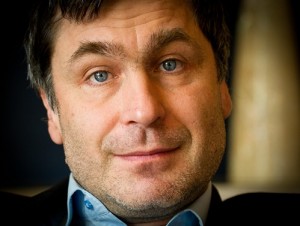
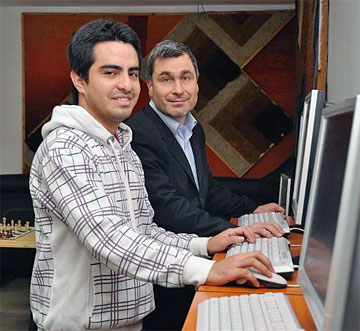
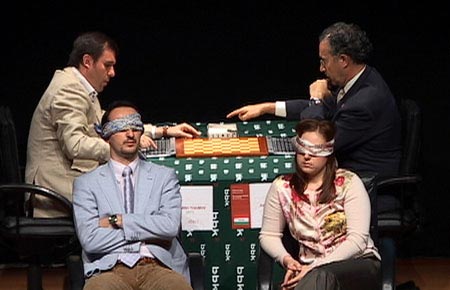
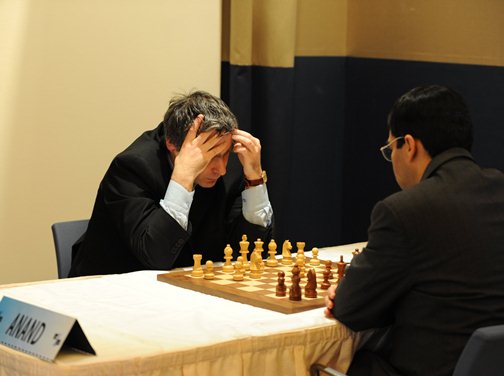
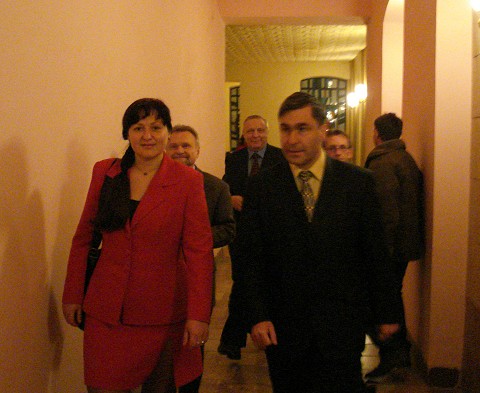

Wonderful! Thanks so much! :-)
The world record belongs to the Miguel Najdorf, who gave a display on 45 boards. Flesch’s record was flawed.
” I learned an awful lot at precisedly that time.”
” your memory washes away the feeling of losing” has a weird illogical feel to it (is it due to the translation?)
Thanks again! Changed “precisedly” (and “persistance”). It might sound a little paradoxical but I think the memory comment makes perfect sense – i.e. memory’s selective and alters what’s remembered. The translation seems ok to me, though variants like “erases the sense of defeat” might be better! :)
Such a wonderful article(s), thank you for this translation. I’m off to find some Ivanchuk games. :)
Just wanted to check that the translation was ok (“more correct” might have been “the feeling of losing doesn’t stay in memory forever”). I think i see memory as a container while the comment talks of it as an active agent… whatever, sorry :)
if the translation is correct, then I love the comment… feels like a chucky-line.